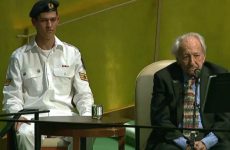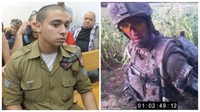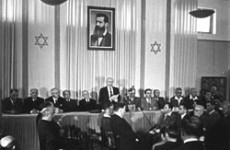Hungarian Jew, Joined the British army during World War II and was executed by a firing squad in Hungary
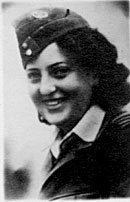 Szenes was one of 37 Jews living in Palestine, now Israel, who were trained by the British army to parachute into Yugoslavia during World War II in order to help save the Jews of Hungary, who were about to be deported to the German death camp at Auschwitz. Szenes was arrested at the Hungarian border, imprisoned and tortured, but she refused to reveal details of her mission, and was eventually tried and executed by firing squad.
Szenes was one of 37 Jews living in Palestine, now Israel, who were trained by the British army to parachute into Yugoslavia during World War II in order to help save the Jews of Hungary, who were about to be deported to the German death camp at Auschwitz. Szenes was arrested at the Hungarian border, imprisoned and tortured, but she refused to reveal details of her mission, and was eventually tried and executed by firing squad.
Szenes, the daughter of an author and journalist, was born in Budapest. She demonstrated her own literary talent from an early age, and she kept a diary from age 13 until shortly before her death. Although her family was assimilated, anti-Semitic sentiment in Budapest led her to involvement in Zionist activities, and she left Hungary for Eretz Yisrael in 1939. She studied first at an agricultural school, and then settled at Kibbutz Sdot Yam. While there she wrote poetry, as well as a play about kibbutz life.
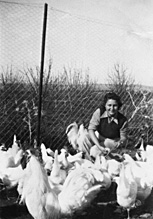 In 1943 Szenes joined the British Army and volunteered to be parachuted into Europe. The purpose of this operation was to help the Allied efforts in Europe and establish contact with partisan resistance fighters in an attempt to aid beleaguered Jewish communities. Szenes trained in Egypt and was one of the thirty-three chosen to parachute behind enemy lines. With the goal of reaching her native Budapest, Szenes was parachuted in March, 1944 into Yugoslavia, and spent three months with Tito’s partisans. Her idealism and commitment to her cause are memorialized in her poem “Blessed is the Match,” which she wrote at this time.
In 1943 Szenes joined the British Army and volunteered to be parachuted into Europe. The purpose of this operation was to help the Allied efforts in Europe and establish contact with partisan resistance fighters in an attempt to aid beleaguered Jewish communities. Szenes trained in Egypt and was one of the thirty-three chosen to parachute behind enemy lines. With the goal of reaching her native Budapest, Szenes was parachuted in March, 1944 into Yugoslavia, and spent three months with Tito’s partisans. Her idealism and commitment to her cause are memorialized in her poem “Blessed is the Match,” which she wrote at this time.
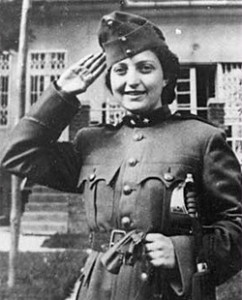 On June 7, 1944, at the height of the deportation of Hungarian Jews, Szenes crossed the border into Hungary. She was caught almost immediately by the Hungarian police, and although tortured cruelly and repeatedly over the next several months, refused to divulge any information. Even the knowledge that her mother was at risk and that she too might be harmed did not move Szenes to cooperate with the police. At her trial in October of that year, Szenes staunchly defended her activities and she refused to request clemency. Throughout her ordeal she remained steadfast in her courage, and when she was executed by a firing squad on November 7, she refused the blindfold, staring squarely at her executors and her fate.
On June 7, 1944, at the height of the deportation of Hungarian Jews, Szenes crossed the border into Hungary. She was caught almost immediately by the Hungarian police, and although tortured cruelly and repeatedly over the next several months, refused to divulge any information. Even the knowledge that her mother was at risk and that she too might be harmed did not move Szenes to cooperate with the police. At her trial in October of that year, Szenes staunchly defended her activities and she refused to request clemency. Throughout her ordeal she remained steadfast in her courage, and when she was executed by a firing squad on November 7, she refused the blindfold, staring squarely at her executors and her fate.
In 1950, Szenes’ remains were brought to Israel and re-interred in the military cemetery on Mount Herzl. Her diary and literary works were later published, and many of her more popular poems have been set to music.
Halikha LeKesariya (A Walk to Caesarea) – by Hannah Szenes
My God, My God, I pray that these things never end,
The sand and the sea,
The rush of the waters,
The crash of the Heavens,
The prayer of Man.
The last song she wrote after she was parachuted into a partisan camp in Yugoslavia:
Blessed is the match consumed in kindling flame.
Blessed is the flame that burns in the secret fastness of the heart.
Blessed is the heart with strength to stop its beating for honor’s sake.
Blessed is the match consumed in kindling flame.
The following lines were found in Hannah’s death cell after her execution:
One – two – three… eight feet long
Two strides across, the rest is dark…
Life is a fleeting question mark
One – two – three… maybe another week.
Or the next month may still find me here,
But death, I feel is very near.
I could have been 23 next July
I gambled on what mattered most, the dice were cast. I lost.
From: The Jewish Agency for Israel, Wikipedia


